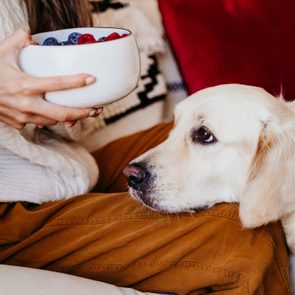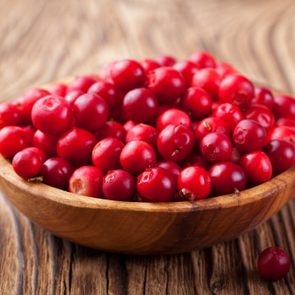Can Dogs Eat Bananas?
Updated: Mar. 08, 2022
Bananas are an important staple food globally. But can dogs eat bananas? Here's what to know about sharing this human food with pups.
What to know if you want to feed your pup banana
Many of us look at what we feed our dogs and wonder if they wouldn’t benefit from a bit more variety, or freshness, in their diet. And most fresh fruits are safe for dogs in moderation.
Many people love bananas, and for some of us, they were even the first fruit we ever ate. And for most people, bananas are a relatively cheap, easy-to-access, healthy food. In 2017 alone, some 114 million metric tons of bananas were produced globally, according to the Food and Agriculture Organization of the United Nations.
But are bananas safe for dogs? According to the experts, yes, but there are some considerations you should make to feed dogs bananas safely.
Here’s what the experts want you to know about feedings dogs bananas.
Why are some foods dangerous for dogs?
According to veterinarians, a dog’s digestive system is a bit different from humans, meaning some foods we have no problem digesting are harder for dogs’ systems to break down, which can cause digestive problems.
Some foods also contain toxins, or other substances that can damage or destroy healthy cells.
Many foods also contain parts, such as seeds, peels, cores, or spikes, that a dog could choke on. In some cases, certain foods may also cause digestive distress for dogs if they eat too much of it.
Can dogs eat bananas?
According to veterinarians, bananas are generally a safe food for dogs.
“Bananas can make great treats,” says Angela Witzel Rollins, DVM, PhD, DACVIM (Nutrition), a professor of veterinary nutrition at the University of Tennessee. “Just avoid the peels.”
But the experts say it’s best to avoid other banana-flavored treats, such as candies, ice cream, and baked goods, because they can contain things that dogs don’t digest well, such as milk and preservatives.
Many banana-flavored treats are also high in fat and processed sugar, both of which are bad for a dog’s health if they eat too much of them.

Are parts of a banana dangerous for dogs?
All of a banana’s flesh is safe for dogs to eat. But while banana peels aren’t toxic to dogs, they can be very difficult to digest. Banana peels may even cause a blockage in a dog’s intestines, which may require veterinary attention to resolve.
For safety’s sake, the experts say you should always remove a banana peel before feeding banana flesh to a dog.
They add that it’s also a good idea to make sure discarded banana peels aren’t put somewhere dogs can easily find them, such as an open trash or organics bin.
Are there any nutritional benefits from feeding dogs bananas?
Bananas aren’t often referred to as a superfood, but maybe they should be. Bananas contain small amount of dozens of important nutrients. But according to the American Kennel Club (AKC), bananas are especially rich in:
Potassium
Potassium is an essential nutrient that helps cells function properly by maintaining the correct fluid volume inside cells and elements of a cell’s membrane that allow nutrients to pass through it, according to the National Institutes of Health (NIH).
Vitamin B6
Vitamin B6 is involved in at least 100 different enzyme reactions in the body, primarily those that help us digest protein, per the NIH. Vitamin B6 also plays a role in healthy immune functioning, blood formation, and cognitive development.
Vitamin C
Vitamin C contains high concentrations of antioxidants, compounds that help protect cells from damage that can contribute to developing conditions such as cancer and cardiovascular disease.
In fact, vitamin C even seems to help regenerate other antioxidants, such as vitamin E.
Vitamin C also helps with:
- the production of collagen, an important connective tissue that helps with wound healing and skin structure
- immune function
- the digestion of proteins
- the absorption of non-heme iron, the type of iron found in plants
Fiber
According to the experts, fiber is an excellent nutrient for humans and dogs. Fiber helps promote healthy digestion and makes you feel fuller for longer, which can help dogs maintain a healthy body weight or lose weight.
Magnesium
Magnesium is also involved in more than 300 enzyme processes in the body that help:
- digest proteins
- control blood pressure and blood glucose levels
- nerve and muscle function
- energy production
Is there any other reason to feed dogs bananas?
The experts say there is no specific reason, or need, to feed bananas to dogs. But they do say that, like humans, dogs enjoy variety in their diet.
So switching things up, and giving a dog the occasional fruit or veggie, may be exciting or interesting for them.
According to veterinarians, eating a varied diet may also help prevent dogs from becoming bored and even rejecting foods that should make up most of their diet, such as dry or wet food specially formulated to meet their specific nutritional needs.
How to feed dogs bananas
While all the banana flesh, or fruit, is safe for dogs to eat, the experts say you should always remove a banana’s peel before feeding it to a dog. They also recommend cutting the banana into small pieces before feeding it to dogs to avoid the risk of them eating it too quickly, eating too much, or choking on it.
According to the AKC, allowing a dog to eat a lot of bananas can cause digestive problems. Bananas are also especially high in fruit sugars or fructose. And veterinarians say eating too much sugar, of any kind, can lead to serious complications for dogs just as it can for humans, including obesity and type 2 diabetes.
“Bananas are perfectly safe to feed your dog as long as they are cut into small pieces,” says Tina Wismer, DVM, the senior director of toxicology for the ASPCA Animal Poison Control Center.
“Be sure to always remove the peel and remember that snacks should equate to no more than 5 percent of their daily caloric intake, so keep portion sizes small.”
Fun ways to feed dogs bananas
The AKC says there are plenty of ways to feed bananas to dogs safely that may also make the event especially enjoyable or exciting, such as:
- freezing a whole banana and then removing the peel and cutting it up
- mushing banana into regular food
- putting banana flesh into a toy such as a Kong and freezing it
- mixing banana in with other dog-friendly fruits or veggies, such as strawberries, raspberries, blueberries, blackberries, cranberries, apples, cucumber, mango, oranges, peaches, pears, pineapple, watermelon, broccoli, carrots, celery, Brussels sprouts, peas, spinach, and green beans
- coating or mixing banana in with other dog-friendly favorites, such as peanut butter or mild cheese
- puréeing frozen banana to make dog-friendly banana ice cream
Foods that are dangerous for dogs
While many fruits and vegetables that are safe for humans to eat are also safe for dogs to eat, some should be avoided because they can cause problems ranging from mild indigestion to toxicity and death.
According to all the experts interviewed for this article, grapes and related products are the most dangerous fruits for dogs.
“Grapes, raisins, and currants are associated with kidney injury and neurological disease in dogs, although the exact toxicity is not well-defined,” says Jennifer A. Larsen, DVM, MS, PhD, professor of clinical nutrition at the University of California-Davis Veterinary Medicine Teaching Hospital.
“Recently, tartaric acid has been implicated and is a target of ongoing research,” she adds.
The AKC and experts say some other fruits and vegetables that can be dangerous for dogs or do not make sense to feed to dogs, include:
- onions and leeks
- mushrooms
- avocado
- cherries
- tomatoes
- asparagus
- garlic
- caffeine
- chocolate
- candy
- gum
- alcohol
- hops
- yeast dough
- potatoes
- plant stems, leaves, skins, cores, seeds, pits, and stones
- hops
- many seasonings and salt
- cooking oils and butter
- macadamia nuts, almonds, and walnuts




















